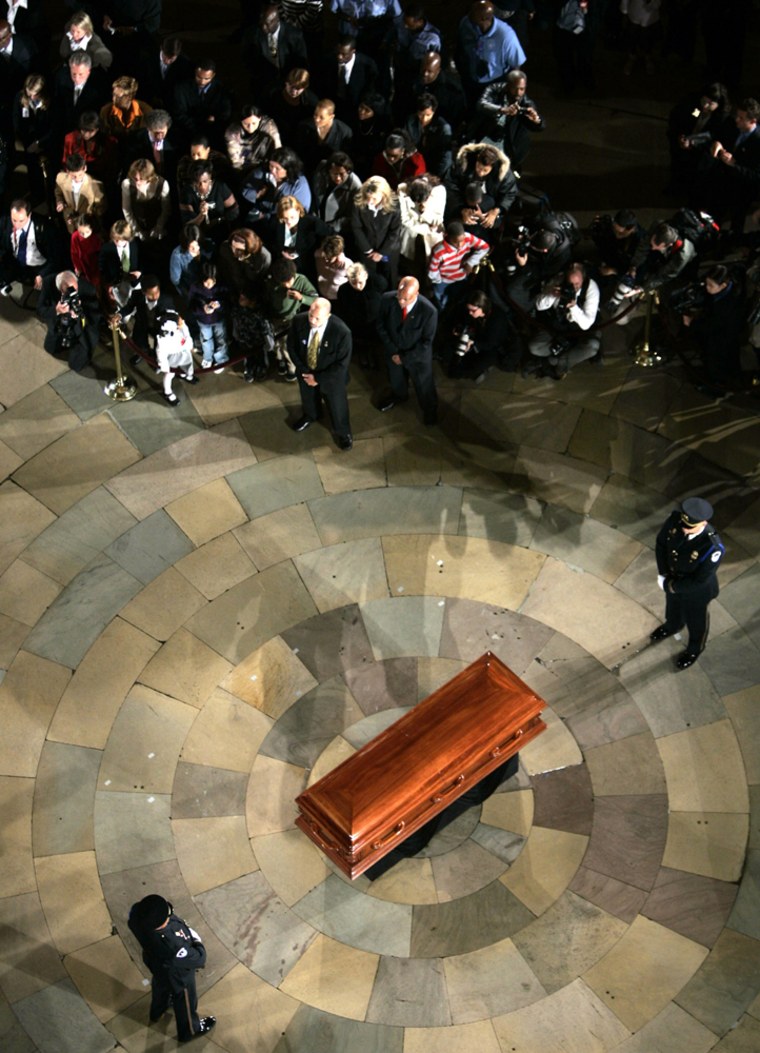President Bush, members of Congress and ordinary Americans paid tribute to Rosa Parks under the soaring dome of the Capitol Rotunda on Sunday, honoring the woman whose defiant act on a city bus challenged segregation in the South and inspired the civil rights movement.
Parks, a former seamstress, became the first woman to lie in honor in the Rotunda, sharing an honor bestowed upon Abraham Lincoln, John F. Kennedy and the nation’s highest leaders. Bush and congressional leaders paused to lay wreaths by her casket, while members of a university choir greeted her with “The Battle Hymn of the Republic.”
Parks died Monday at her home in Detroit, at the age of 92.
“She was a citizen in the best sense of the word,” said Sen. Tom Harkin, D-Iowa, who was among several lawmakers who paid homage to Parks. “She caused things to happen in our society that made us a better, more caring, more just society.”
Outside the Capitol, thousands of people awaited the chance to pay their respects, some arriving before noon to be able to file past her casket. Some carried signs that read, “Thank you, Rosa Parks.”
Public viewing was to last until midnight on Sunday and from 7 a.m. until 10 a.m. on Monday.
Fred Allen, 59, who grew up in segregated Halls, Tenn., brought his 20-year-old son to help him understand the civil rights era.
‘She started the movement’
“He has no idea what it was like to grow up in the South, where you had to hold your head down,” Allen said.
Robert Cunningham, 65, caught a flight from Atlanta with his wife, daughter and four grandchildren so they could pay their last respects. When they learned Friday night that Parks’ body would lie in honor in the Capitol, Cunningham’s wife said, “We have to go.”
“She started the movement,” Cunningham said of Parks, staring at the West facade of the Capitol. “She was the mother of the civil rights movement by simply saying, ’I’m tired of giving up my seat.”’
Earlier Sunday, Parks was remembered by hundreds of mourners in Montgomery, Ala., including Secretary of State Condoleezza Rice, who was raised in Alabama.
Roses and memories
Cascades of roses surrounded Parks’ casket in a chapel bearing her name at St. Paul A.M.E. Church, where she was once a member. A separate wing was opened for the overflow crowd and hundreds more stood outside.
“I was here when Rosa Parks started and I just wanted to be here when she departed,” said the Rev. Joseph Lowery, who co-founded the Southern Christian Leadership Conference with the Rev. Martin Luther King Jr.
From Montgomery, Parks’ body was flown to Baltimore-Washington International Thurgood Marshall Airport in Maryland. A motorcade escorted Parks’ body, and her delegation, to the Capitol.
Bush makes proclamation
President Bush issued a proclamation Sunday ordering the U.S. flag to be flown at half-staff over all public buildings on Wednesday, the day of Parks’ funeral and burial in Detroit.
At the memorial service in Montgomery, Rice said she and others who grew up in Alabama during the height of Parks’ activism might not have realized her impact on their lives then, “but I can honestly say that without Mrs. Parks, I probably would not be standing here today as secretary of state.”
Alabama Gov. Bob Riley credited Parks with inspiring protests against social injustice around the world.
“I firmly believe God puts different people in different parts of history so great things can happen,” Riley said. “I think Rosa Parks is one of those people.”
‘A gentle giant’
Parks was arrested in 1955 for refusing to give up her bus seat to a white man. Among those who supported her was King, who led the 381-day boycott of the city’s bus system that helped initiate the modern civil rights movement.
“She was a gentle giant,” his son, Martin Luther King III, said at the memorial.
“I think she had a defining stand in the civil rights movement,” said Estella Jernigan, 20, a student at Troy University, before the service started.
Lowery and the Rev. Jesse Jackson said the best way for black Americans to carry on Parks’ legacy would be to push Congress to renew the 1965 Voting Rights Act, which they said would be in jeopardy when it comes up for review in 2007.
Sharpton ponders what-ifs
The Rev. Al Sharpton, who was a year old at the time of Parks’ arrest, said when he arrived in Montgomery for the memorial, he thought about “how if she had just moved her seat, how history might have changed.”
Sharpton, a New York City activist, said national leaders such as Rice and former Secretary of State Colin Powell would have never reached their posts without Parks’ symbolic act. Rice would be struggling in a racially charged Birmingham and “Colin Powell would be sitting in a segregated Army barracks,” Sharpton preached to the cheering audience.
Johnnie Carr, a 94-year-old veteran of the bus boycott, said Parks was her childhood friend, a woman who “gave every ounce of her devotion” to fighting racial inequality.
“We have accomplished a lot, we’ve come a long way, but believe me, we have a long way to go,” Carr said.
